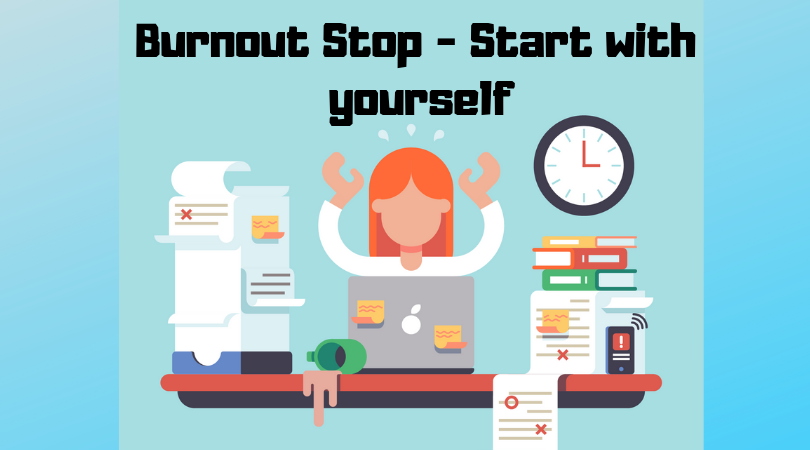First, recognize your stress patterns. Please edit the following questions:
- When do I notice tunneling or black and white thinking?
- When do I do many things at once?
- Where does my own attitude urge me to do things quickly?
- Where in my body do I feel tension in such situations?
- When do I notice too fast speaking?
If you want to change something in your life, you must know what is important. If you want to change something, you need a vision of your future life. If you do not change anything and leave your attitudes and behaviors that way, the likelihood of your burnout risks improving is 0%! Only if you are determined to reevaluate your environment’s events, reduce your burdens, and build up your resources is there a prospect of improvement in sight. How about aspiring to new goals?
Formulate your goals
Maybe you can find the right destinations for you in the following list?
- I professionally implement change strategies.
- I perceive my strengths and formulate them clearly.
- I praise myself. By my self-praise, I become more independent of the recognition of others.
- When thoughts arise that are not helpful in the situation, I interrupt my destructive thinking and set a mental stop sign.
- I only deal with one thing.
- I notice without evaluating.
- I note or paint my “ABC thinking” with recurring destructive thoughts. This increases my self-observation and I manage to regulate my emotions. My new alternatives at “B” prevent slipping into helpless “A-C thinking.”
- As soon as I recognize stress patterns, I start my protection program
Turn to your own goals
Every goal that you achieve gives you a sense of achievement and is associated with joy. Find your own expertise. Unhappy people are almost only concerned with their weaknesses, while the so-called lucky ones embrace their strengths and actively implement them. If you do what you love and are good at, then there is hardly anything in the way of professional success. Your life goals should be less selfish or material. It is more about your visions.
Top in the job: And now you.
But beware: typical risks of burnout sufferers are:
- They are setting their goals too high.
- They underestimate the time and endeavor required.
- They overlook likely side effects.
- They overestimate their chances of success.
- They insist rigidly and inflexibly on enforcing their “to-do list.”
Therefore, those affected should at least “down a gear” and “stay on the carpet.” Sometimes corrections are necessary in life planning. Resilience is necessary for this. The latter, in turn, needs as counterweight an internal stability, eg. the attachment to colleagues, partners, family or friends.
Find the solution to your problems
Some people seem to be annoyed not only by minutes and hours, but months and years (tenth) of a single situation. They push their current problems on the messed-up education, the impossible teacher, the boss at the time, etc., and thus negatively impact their current lives.
How much energy and precious life do you want to invest (still) for this annoyance?
Is not it enough? If so, then you “cancel” the thought in your head that has become negative. It does not matter if it concerns the old expectations of your parents or friends. At some point should be over. Most people assume their self-control and say goodbye to the mental expectations of others in their mid to late twenties. Other people succeed only at 40 or 50 years or even later! You are the master of your brain and you decide who is staying there and who is not.
You can not prevent the birds from being fly over your head
,but you can prevent them from building a nest in it. (Chinese wisdom)
Accept “annoying” changes
People make mistakes – you too. Accept your own mistakes and those of others. That has always been and will always be the case. Emotions are initially a sign of commitment. They arise when someone is enthusiastic about a cause and takes a task seriously or is important to it.
Anger always occurs when something does not suit us as it is. Without question, shouting out anger towards bystanders is wrong. But a feeling oppression is similarly wrong. Such suppression costs a lot of strength.
Take a decisive step towards the tasks given by life and look at things from a realistic perspective.
Improve your time management
Former US President Eisenhower developed a clear and easy way to distinguish important from unimportant. He estimated each of his tasks in 4 categories:
What is important and urgent?: He completed these tasks immediately and himself.
What is important but not urgent?: Eisenhower did this immediately after the duties of the first category.
Which tasks are urgent but not important?: These were delegated by him.
Which are neither important nor urgent?: He threw these into his wastebasket and did not do them at all.
Thus Eisenhower did not care about pure urgency – he looked more at the importance. Setting priorities is a prerequisite to dealing with time more economically.
Do a “to-do list”
Some colleagues complain that in their free time they think about work and can hardly switch off. They ponder what they have to do at the next service and try convincingly not to forget about it.
Remove stress hormones
Some employees refuse regular endurance sports in their spare time on the grounds that they already have enough work, standing and running in the job. But more and more colleagues find that the sporty pressing the pent-up negative energies easier to break down. In addition, due to the flow, “happiness hormones” are released and you will be happy all the time.
Also, social contacts arise during sports, lead by the reduction of internal tension and aggressive moods by the good performance increase to strengthen your self-confidence.
Increase your well-being
Surround yourself with pleasant people, plants and animals. Increase your physical well-being through self-care, sports, and wellness. Focus positive and constructive – let go of negative. Change your perspective. Love the Mental Islands of Others.
Reward yourself
In some companies, there are so-called tip or station funds. Here at certain intervals, the team members are paid smaller amounts. Some colleagues use these for their current household budget. Others reserve the amount and indulge in a spa treatment or foot reflexology massage, get a maid for their beloved household activities, or fund self-care activities.
If you like, install an aroma lamp for your breaks and sit in the coach seat for a short relaxation. These 3-5 minutes are a simple yet effective way to balance work.

Hang a commendation mirror surrounded by small positive messages. Look in daily and find your way around the inscription you have designed: “Spoil yourself!”.
Thank you
When you do something good for others, this has a tremendous effect on your own state of mind. It sounds abstruse, but it works: by the kindness shown to others, you also experience friendly to yourself. Distribute human attention in moderation – the last 2 words are, especially for burnout-endangered readers.
Get for yourself – and give tenderness to your fellow man: by loving listening, praising or a friendly look, as well as by skin contact, hugging someone and stroking. This does not only strengthen your self-esteem, but also your own.


